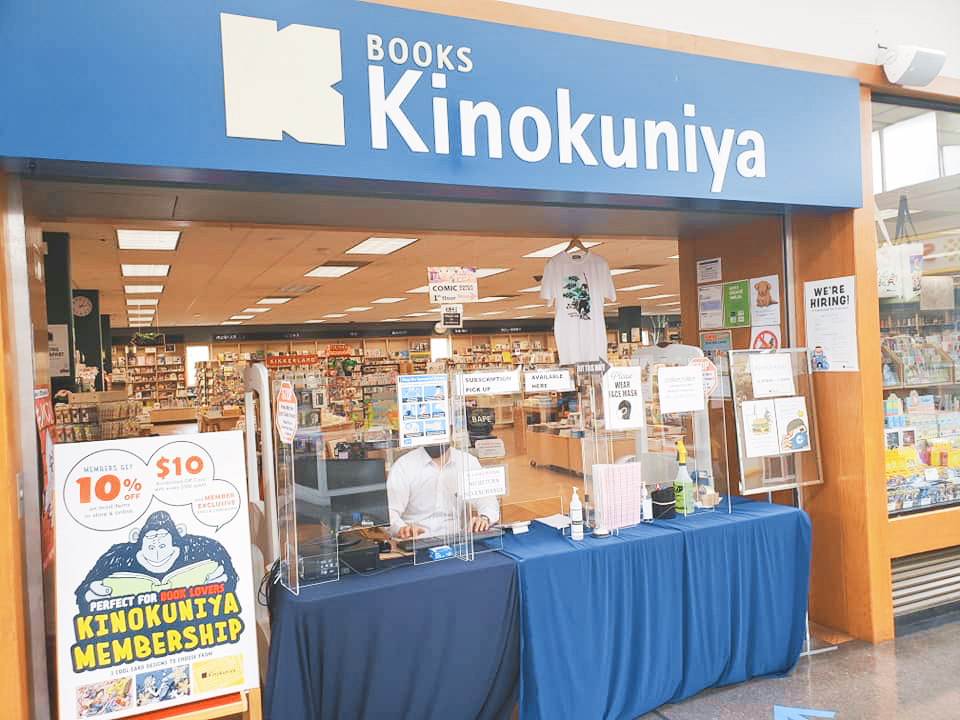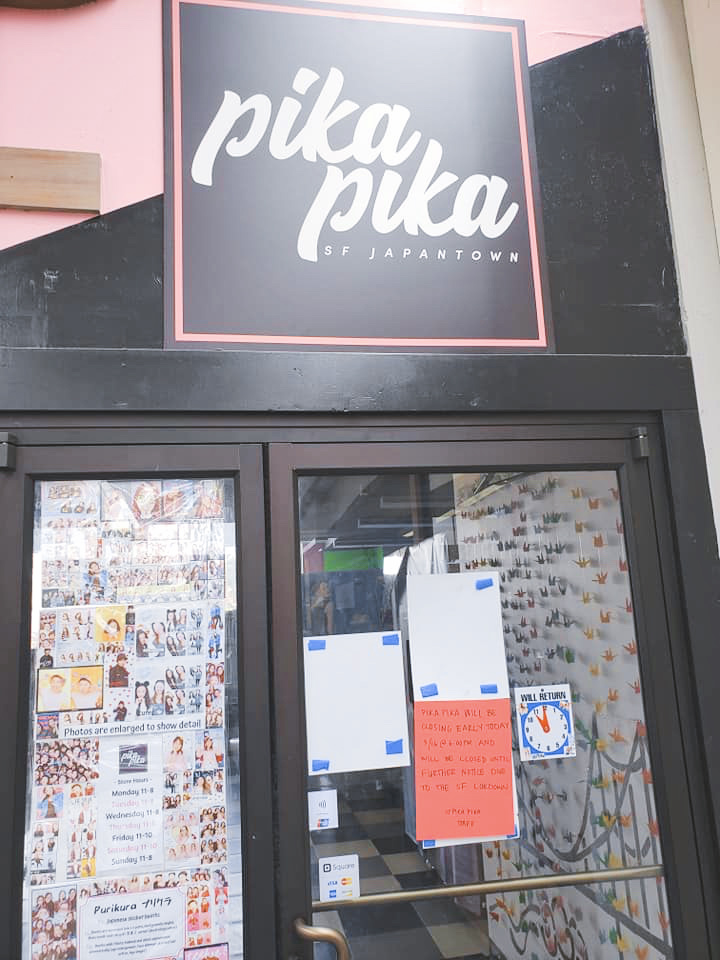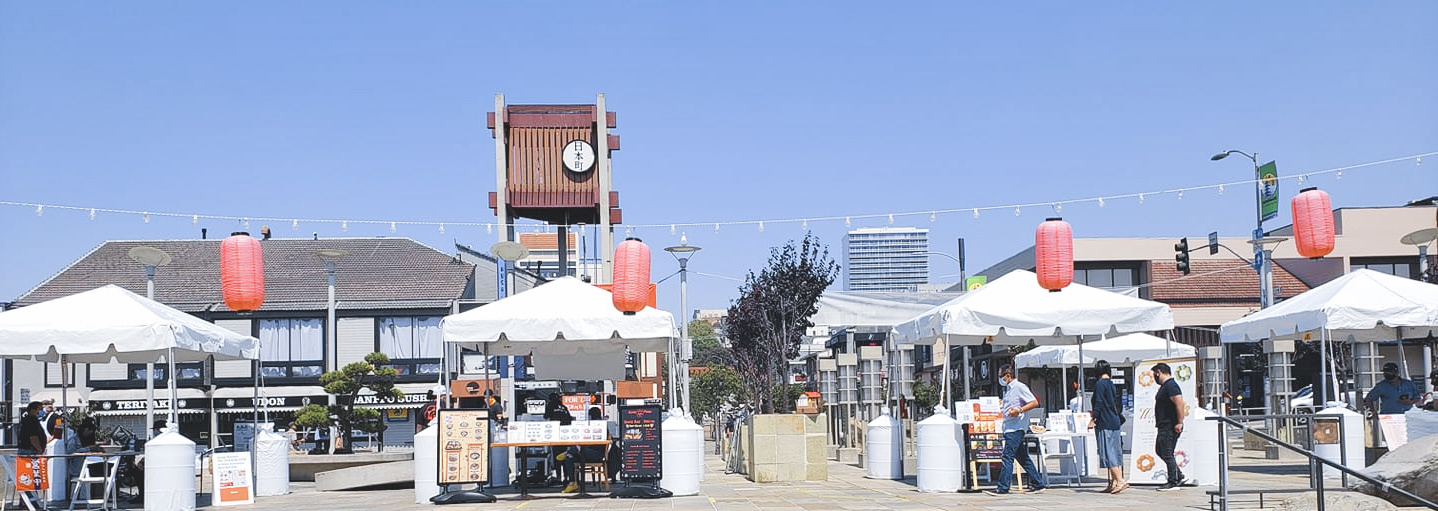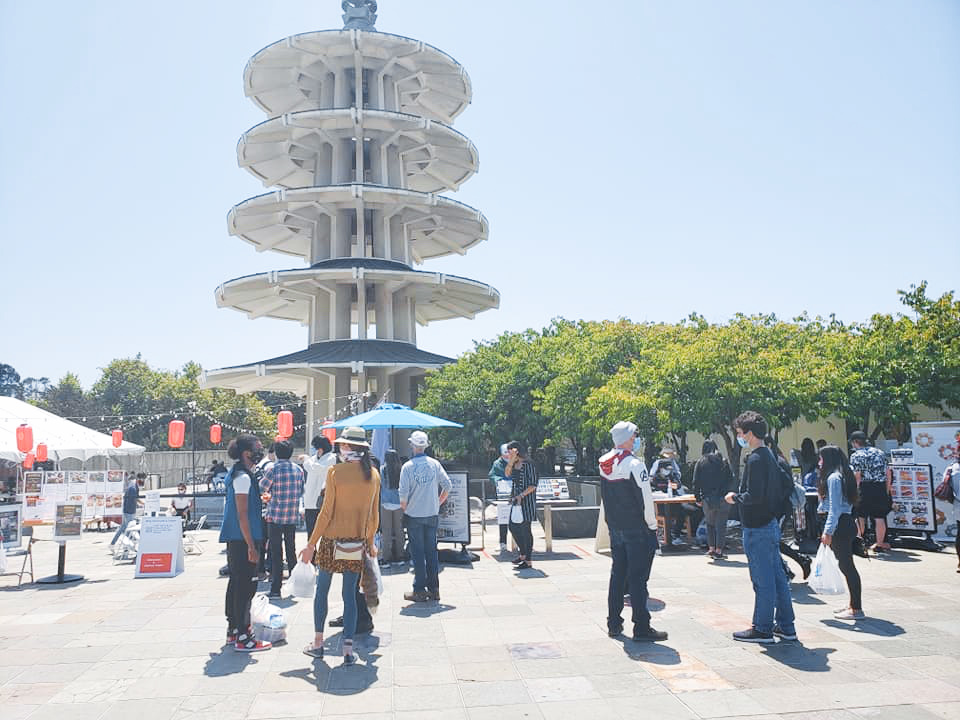The “Picnic at the Plaza” program has helped generate nearly 70 percent of Japantown restaurant revenue since its start in mid-July. (Photo: David Toshiyuki/Facebook)
The future of San Francisco Japantown’s small businesses hangs in the balance as the unrelenting pandemic continues.
By Haruka Roudebush, Contributor
Like communities everywhere throughout the United States, San Francisco’s Japantown community has witnessed dramatic changes in day-to-day life since COVID-19 shelter-in-place restrictions took effect in mid-March.
In addition to the stress and necessary adjustments stemming from the disruption to everyday life and concerns for public health and safety, Japantown is now faced with increasing anxiety for the future of the community as the pandemic continues to take its toll on the economy.
As the small businesses of the neighborhood have struggled to survive despite the earnest support of the community, Japantown’s two major commercial landlords in the main Japan Center shopping mall have remained unresponsive to attempts by mall tenants to negotiate rents, late fees and repayment of back rent from the months COVID kept neighborhood businesses shuttered or operating at greatly reduced capacity.
Many are concerned that the continuing demands of the Japan Center mall landlords threaten the imminent closure of small businesses in the mall, and with the potential loss of Japantown’s shops and restaurants en masse, the fate of the community grows precariously uncertain.
Japantown is now faced with what seems to be the next iteration of challenges to its survival since the forced relocation and incarceration of the community during World War II. The shopping mall itself has its own controversial history in the community.
It opened in 1968 as the Japanese Cultural and Trade Center following the displacement of 8,000 neighborhood residents and family businesses, as the city Board of Supervisors deemed the area as blighted and designated it to be redeveloped by the San Francisco Redevelopment Agency in the late 1950s.
Since the opening of the shopping center, the Peace Plaza, with its iconic concrete pagoda flanked by the mall buildings to the east and west, has dominated the neighborhood’s remaining square blocks and is a main attraction and gathering point for visitors and locals alike.

Kinokuniya Bookstore is one of the mall’s anchor tenants; Kinokuniya Bookstores of America is a main building landlord. (Photo: David Toshiyuki/Facebook)
Within the mall, the main building landlords are currently the Kinokuniya Bookstores of America, the corporate entity of one of the mall’s anchor tenants, as well as Beverly Hills-based real estate investment firm 3-D Investments, whose quick purchase of its holdings in the Japan Center in 2006 from Japan-based corporation Kintetsu Enterprise Company of America also evoked outcry from the community.
The possibility of the new ownership deciding to tear down the mall to redevelop the property into market-rate high-rise housing was a primary concern of the community at the time of the sale. Community leaders and organizers concerned for the preservation of Japantown’s cultural heritage then turned to the city government for support that resulted in a set of agreements made by 3-D Investments and enforceable by the city government that promised that the developers would not sell the properties for 15 years and that they would maintain the cultural heritage of the neighborhood by retaining Japanese-themed commercial tenants in the mall, as well as commitments to allow the community to use the malls for annual celebrations such as the Cherry Blossom Festival and make financial contributions to local community organizations.
The covenant made under then-Mayor Gavin Newsom is currently set to expire in 2021, at which time it is uncertain what the developers will choose to do with their mall properties.
Shortly after the COVID-19 shelter-in-place order took effect in San Francisco on March 17, the entire mall was also forced to close for what was initially assumed a limited time. However, as the pandemic has dragged on for months, back rent and bills have been mounting, already resulting in several businesses in Japantown closing permanently.
While restaurants in the Japan Center have continued to operate to serve take-out and delivery orders, restaurants inside the mall without immediate street access to set up outdoor dining have suffered major losses of revenue from indoor dining.
San Francisco’s shelter-in-place restrictions began to ease in June, allowing for patrons to re-enter the mall for limited capacity and contactless shopping. But with severe declines in foot traffic to retailers and restaurants, businesses have only been able to generate a fraction of their normal volume of business.

Tenant Pika Pika, classified as an entertainment space, has been unable to reopen since March due to COVID-19 restrictions. (Photo: David Toshiyuki/Facebook)
“From talking with some of the other businesses in the malls, most of us were only bringing in about 20-30 percent of the revenue we’d normally be bringing in,” said Ryan Kimura, owner of Pika Pika, a shop operating Japanese photobooths in the Kinokuniya building. “It’s not enough to cover our overhead.”
For businesses like Pika Pika that are designated as entertainment spaces — including bars, arcades and karaoke lounges — COVID-19 restrictions have prevented them from reopening at all since March. Unfortunately, now with the recent spike in COVID cases nationally, all indoor dining in San Francisco was suspended on Nov. 13, presenting another slowdown in business for the immediate future.
Meanwhile, as the mall’s businesses have suffered, Kinokuniya and 3-D have continued to demand full rent from their tenants, as well as continuing to charge for Common Area Maintenance (CAM) fees and utilities, as well as adding on late fees for rent.
The charges for CAM fees in the mall had already been an existing issue of contention with tenants, as CAM charges had increased over the past year without itemized justification from the landlords’ property management company.
Over the past year and a half when Kinokuniya brought in Davis Property Management company to administer rent and CAM fees in the building, CAM fees had more than doubled for tenants.
Kimura elaborated: “Once Davis Property Management came in, my CAM fees and utilities went from about $1,000 a month to $3,500. Restaurants that use gas and water probably have had to pay even more than that. With back rent, I owe over $50,000 since March. We’ve been closed since then, and we haven’t been bringing in any revenue during that time.
“We weren’t sure at that point when we’d be able to reopen,” Kimura continued. “The tenants in the Kinokuniya building collectively asked Kinokuniya’s property management company in late March for some sort of rent relief. We were initially told in April that they would defer one month of rent and have us pay it back over the period of six months, starting in August.”
It quickly became evident that the initial remedy offered by Kinokuniya would be insufficient. However, Kinokuniya did not offer any further relief or leniency after its tenants requested additional assistance.
By May, the tenants of the Kinokuniya building had enlisted the help of attorneys Diane Matsuda and Dean Ito-Taylor from community advocacy organization Asian Pacific Islander Legal Outreach (APILO) and attorney Alan Low of law firm Perkins Cole, who agreed to provide legal counsel to the Japan Center businesses in negotiations with Kinokuniya and 3-D pro bono.
The tenants’ attorneys’ attempts in May to initiate further rent relief negotiations with Kinokuniya and 3-D have not progressed since.
At public meetings, our landlords have claimed that we’re all in this together, but what they’ve shown is that they’re not willing to negotiate,” said Stephen Jordan, proprietor of the Sakura Sakura shop in the West Mall. “They’re more concerned about collecting rent than the livelihood of our community.”
Newsom issued an executive order establishing a statewide eviction moratorium by the end of March 2020, which has since been extended through the end of March 2021. Similarly, San Francisco Mayor London Breed placed a COVID eviction moratorium for the city of San Francisco that was extended through the end September, and again through the end of November.
By October, with the expiration date of the city’s eviction moratorium approaching, the tenants’ attorneys began working with San Francisco city officials to draft an ordinance to extend the moratorium deadline to match the state’s deadline to the end of March 2021, as well as provide a pathway for the city’s small businesses to repay back rent owed over the course of the following two years without the threat of eviction.
Kimura and other Japan Center businesses initiated a citywide campaign titled “Save SF Small Businesses” to lobby the city Board of Supervisors to pass the ordinance, which was sponsored by city district supervisors Aaron Peskin, Ahsha Safai and Japantown’s own district supervisor, Dean Preston.
The campaign garnered more than 1,000 signatures for its online petition and inundated district supervisors with emails and phone calls from constituents, with additional social media support from primarily Yonsei community activists and organizers from the recently formed Japantown for Justice organization.
Voices in support of the ordinance during public comment at the Board of Supervisors’ hearings came prominently from small business owners and community members from San Francisco’s Chinatown and Japantown communities, including Judy Hamaguchi, San Francisco JACL chapter board member.
During the Land Use and Transportation committee hearing on Nov. 2, Supervisor Peskin stated, “ … our imperative is to maintain the cultural fabric of different neighborhoods in San Francisco ranging from Chinatown, that I represent, to Japantown that Supervisor Preston represents, and other neighborhoods across the city, and we cannot afford to delay this because if we do, we will wake up to communities like Chinatown that are decimated with the unique cultural heritages that they represent.”
The ordinance was passed by the Board of Supervisor’s Land Use and Transportation Committee on Nov. 2, and with a unanimous 11-0 vote by the full city board on Nov. 10. The ordinance was further amended on Nov. 17 to clarify provisions in the legislations to allow small businesses with under 10 employees to terminate their leases early upon paying back rent owed.
While the passing of the ordinance has provided a temporary sense of relief to Japan Center tenants from the threat of eviction, businesses are still burdened with what might be insurmountable debt, even with a two-year repayment period for back rent.
Mall tenants hope that the ordinance will apply pressure for the landlords to respond to requests for relief, as attorney Matsuda explained: “Landlords and tenants can continue to negotiate on their own, but what this ordinance does is provide a framework that they can work off of.”
It remains to be seen if Kinokuniya and 3-D will open up negotiations with their tenants moving forward, and small businesses still face the daunting challenge of recovering in the economic downturn while having to find a way to repay back rent once the eviction moratorium ends.
Beyond reliance on the city government to provide a legislative remedy, the pandemic has prompted months of heightened community support for Japantown’s small businesses and organizations.
In an effort to generate foot traffic for the remaining businesses and restaurants, the Japanese Cultural and Community Center of Northern California, with financial support from the Henri and Tomoye Takahashi Charitable Foundation and the Japantown Community Benefits District (JCBD), coordinated the “Picnic at the Plaza” program, which provided socially distanced and sanitized public outdoor seating for Japantown restaurant patrons to enjoy their takeout orders every weekend from mid-July through the end of November.
While weekday foot traffic remains slow due to the lack of tourists, weekend patronage has been bolstered, and the program has helped generate an estimated 70 percent of Japantown restaurant revenue since its start and more than 18,000 patrons served.
Other community efforts to support small businesses have come from fundraising and relief campaigns, including the San Francisco Japantown Foundation, which has raised over $140,000 to be disbursed to Japantown businesses and organizations through grants, as well as the JCBD’s “Heart of Japantown” COVID relief campaign, which raised $500,000 from the community within a month of its launch in late May.
Neighborhood businesses were awarded $5,000 grants from this fund, which JCBD Director Grace Horikiri said were used to help cover overhead expenses such as rent, employee wages and other expenses.
“Some of the funds were also used to purchase PPE for the businesses, including masks and face shields, and installing sneeze guards for store counters. We opened up grant applications for small businesses in September, and we had 80 businesses apply. Thankfully, we were able to fund all 80 businesses,” said Horikiri.
A portion of the funds raised by the “Heart of Japantown” campaign were also used to extend the “Picnic at the Plaza” program through November, which was initially scheduled to end in September. In addition to providing legal counsel, APILO has also provided the mall’s tenants with language support, translating government public health and business operations updates for non-native English speakers into Japanese and Korean.
With the pandemic’s crippling effect on the economy, the community’s response to support Japantown’s small businesses has been encouraging for neighborhood merchants.
Remarked APILO Director Dean Ito Taylor: “Even with the challenges our community is facing, it has truly been inspiring to see this outpouring of love and support for the Japantown community. It’s times like these where the strength of our communities and connections really comes through.”
Added Pika Pika’s Kimura: “I’m truly thankful for the community’s individuals and orgs that really stepped up to help the small businesses, and I think even more so in the community, we’re realizing the power of our [community’s] ecosystem, how important it is. With that being said, our landlords and property owners are a huge part of it. If they’re not at the table with us, a whole lot of the burden will fall on everyone else.”
The community remains anxious for the future as the possibility of the collapse of Japantown’s small business community remains, and much will depend on what relief, if any, the Japan Center’s landlords are willing to provide.
For updates on future developments between the Japan Center mall tenants and Kinokuniya and 3-D, APILO will provide additional information at https://www.apilegaloutreach.org/save-japantown/.
Haruka Roudebush is the immediate past JACL National VP of 1,000 Club, Membership and Services. He currently serves on the JACL NCWNP District’s Executive Board and works as the senior programs manager at the Japanese Cultural and Community Center of Northern California.

Japantown restaurants are only open for take-out and delivery orders, with many setting up stands in the plaza to serve customers. (Photo: David Toshiyuki/Facebook)




